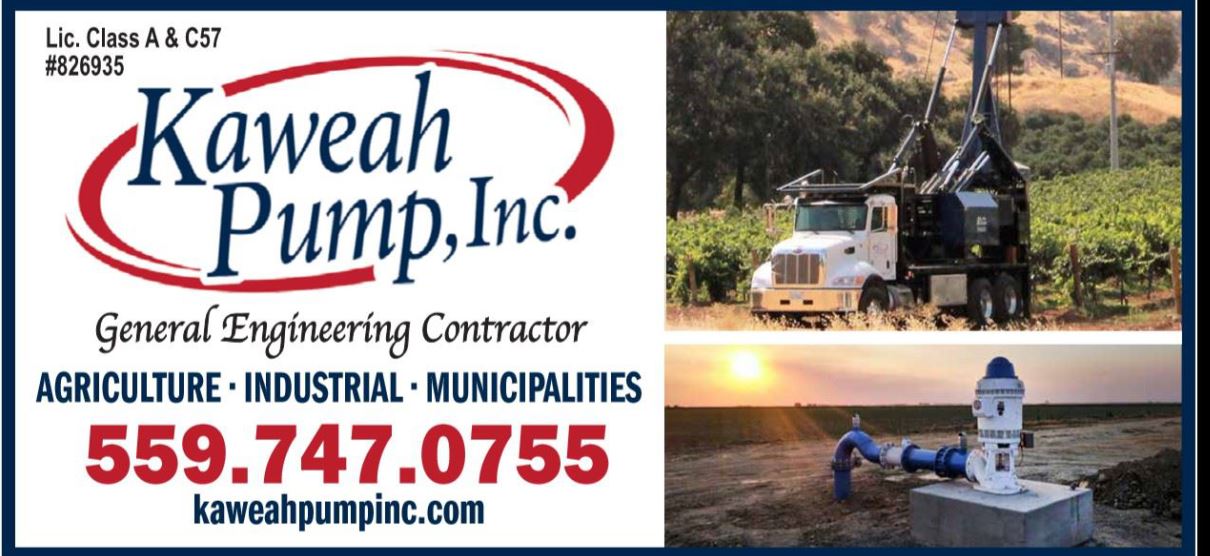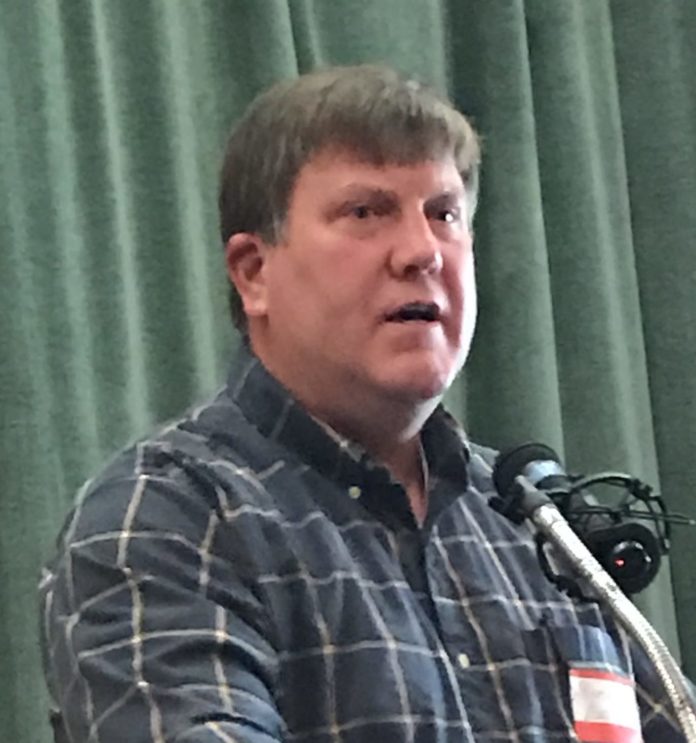 The East Kaweah Groundwater Sustainability Agency held its board of directors on Monday, July 29, 2019 in Exeter. The meeting was held upstairs in the Exeter Museum, next to the water tower. It was hot but there was plenty of cold water and cookies thanks to Karen Yohannes. Thank you Karen. Chairman Ed Milanesio called the meeting to order at 3:00pm. He had us introduce ourselves and there were about 30 of us showed up to give out our names. The agenda was approved and we all saluted this great nation’s flag with the phrase “under God” intact.
The East Kaweah Groundwater Sustainability Agency held its board of directors on Monday, July 29, 2019 in Exeter. The meeting was held upstairs in the Exeter Museum, next to the water tower. It was hot but there was plenty of cold water and cookies thanks to Karen Yohannes. Thank you Karen. Chairman Ed Milanesio called the meeting to order at 3:00pm. He had us introduce ourselves and there were about 30 of us showed up to give out our names. The agenda was approved and we all saluted this great nation’s flag with the phrase “under God” intact.
There was no public comment and the minutes were approved. The first regular item was held in closed session to discuss future staffing and 36 minutes later we were welcomed back into the room. Lindmore Irrigation District and EKGSA General Manager Michael Hagman announced the board will contract with LID to continue with management of the GSA. In consequence of this LID will use the increased income from the GSA to hire more staff to help with the extra load. The board agreed to this arrangement.
In further spending required by SGMA governance costs will be borne by membership dues and implementation of regulations be funded by land based assessments. Hagman is also an accountant and he penciled out a cost of about $7.44 per acre assessments for an annual $856,100 total. The board agreed to this with the understanding there may be other expenses and a Prop 218 election will be held. Some other, one-time study costs to close the data gaps will cost $980,000 to pay for five stream gauges, seven dedicated monitoring wells, video well logging and the actual costs for a Prop 218 election. Hagman said to borrow the $980k from the member agencies with a five year payback with interest. The pay back comes in the form of reduced assessment costs.
One might ask, “What if a member agency doesn’t want to kick up its share?” Hagman said that would force the other members or the county to pay more. I don’t think that will be a problem as who wants to not carry their own weight? It was asked since the member agencies are borrowing from the member agencies why pay interest? Hagman said because the agencies are diverting money from other purposes they deserve a reward. There was more talk about this but I lost the train – if the agencies are borrowing from themselves then aren’t they also paying not only the loan but also the interest? If someone understood this please write me.
Next Hagman presented the figure of $2,500,000 for projects and management actions. The list included recharge, micro-basins, ditch delivery, land retirement, fallowing, irrigation improvements and lastly pumping restrictions. Naturally the question of where that money is coming from was asked. How could you bill based on pumping if there are no meters? Hagman said one way is to bill based on the evapotranspiration shown from satellite imagery as a basis of how much was pumped. What about the grower who used both surface and pumping? ET doesn’t show where the water came from. In any event it most likely won’t happen until next year at the soonest. But after more discussion a grower in the room said under the proposal those pumping the most pay the most and that is equitable. Good for him. Hagman expects the two other GSAs in the Kaweah Sub Basin: Mid Kaweah and Greater Kaweah which are in surplus, would go along. Now, the City of Lindsay wants to skinny out of a 218 assessment and pay by the acre instead since it is currently going through a 218 election. Hagman said this could pencil out well for the GSA since the parcels in the city will be collected by the city instead of the GSA having to come up with 6,000 plus bills spread over a little less than 3,000 acres. Provost & Pritchard engineer Matt Klinchuch said there is some cleaning up of the numbers but this would work. Director Joe Ferreira said while you can’t regulate a de Minimus pumper you can bill them. This also keeps the city’s population out of the ag population. It would not be fair for either to have to pay the rates of the other. The board approved.
So, the way is clear to start working on a 218 election. Hagman said he needs $40,000 right now to get started. EKGSA will get some grant money later on in the process. The board approved a $40k call for funds.
Hagman said the audit is complete but the auditor wasn’t available so we moved on to the GSP schedule. He said the Technical Advisory Committee and the Advisory Committee have not had the opportunity to look over the draft GSP which  would be the public draft. He proposed releasing the draft as an administrative draft to a limited amount of folks – NGOs, board and committee members, other GSAs in the sub basin and the water agencies within the EKGSA. He expects the public draft to be released to the public on September 16th. The board could adopt the GSP on December 16th but Hagman thinks it will be adopted and sent to DWR mid-January before the deadline. Yohannes said she understands the need for limited release but she’d like to receive the comments as well. Hagman said much of the comments will fall into wordsmithing and not substantial. But if there is a comment that intends to change policy then that would be shared publicly if a change in policy is required.
would be the public draft. He proposed releasing the draft as an administrative draft to a limited amount of folks – NGOs, board and committee members, other GSAs in the sub basin and the water agencies within the EKGSA. He expects the public draft to be released to the public on September 16th. The board could adopt the GSP on December 16th but Hagman thinks it will be adopted and sent to DWR mid-January before the deadline. Yohannes said she understands the need for limited release but she’d like to receive the comments as well. Hagman said much of the comments will fall into wordsmithing and not substantial. But if there is a comment that intends to change policy then that would be shared publicly if a change in policy is required.
The new schedule will be to release the admin draft tomorrow July 30th, this comment closes on August 29th. On September 16th the board will release the public draft of the GSP for a 90-day comment period that ends December 16th where the board could hold a hearing to adopt the GSP. Hagman and staff recommend delaying the adoption until mid-January 2020 which would give staff time to prepare for the official submittal to the state. Director Tim Gobler asked attorney Joe Hughes for the reasoning behind an administrative draft. Hughes said this method could prevent some major problem after the public release. It was moved and approved to follow this schedule. The next meeting will mostly likely be in September on the 16th with August board meeting cancelled. The meeting then went back into closed session.
DISCLAIMER OF RESPONSIBILITY; Waterwrights strives to provide his clients with the most complete, up-to-date, and  accurate information available. Nevertheless, Waterwrights does not serve as a guarantor of the accuracy or completeness of the information provided, and specifically disclaims any and all responsibility for information that is not accurate, up-to-date, or complete. Waterwrights’ clients therefore rely on the accuracy, completeness and timeliness of information from Waterwrights entirely at their own risk. The opinions expressed in this report are those of the author and do not represent any advertisers or third parties.
accurate information available. Nevertheless, Waterwrights does not serve as a guarantor of the accuracy or completeness of the information provided, and specifically disclaims any and all responsibility for information that is not accurate, up-to-date, or complete. Waterwrights’ clients therefore rely on the accuracy, completeness and timeliness of information from Waterwrights entirely at their own risk. The opinions expressed in this report are those of the author and do not represent any advertisers or third parties.
ALL RIGHTS RESERVED. Copyright 2019 by Don A. Wright
SGMA The Sustainable Groundwater Management Act of 2014 calls for the formation of Groundwater Sustainability Areas within Basins and Sub-basins to develop Groundwater Sustainability Plans.
EAST KAWEAH GSA 315 E. Lindmore  Street, Lindsay, CA 93247. Telephone 559/562-2534. Mailing address PO Box 908 Lindsay, CA 93247 Meetings are generally the 4th Monday of the month at the Exeter Museum at 3:00 pm.
Street, Lindsay, CA 93247. Telephone 559/562-2534. Mailing address PO Box 908 Lindsay, CA 93247 Meetings are generally the 4th Monday of the month at the Exeter Museum at 3:00 pm.
Members: County of Tulare, City of Lindsay, Exeter ID, Ivanhoe ID, Lindsay Strathmore ID, Lindmore ID and Stone Corral ID. Ed Milanesio of Lindmore is chair.
Staff: Michael Hagman – Executive Director, Joe Hughes – Attorney,  Matt Klinchuch – Consulting Engineer
Matt Klinchuch – Consulting Engineer
DWR Listing: Basin San Joaquin Valley, Sub Basin Kaweah 5-022.11






























